Differences Between Certification Labs – GIA, AGS, EGL, IGI
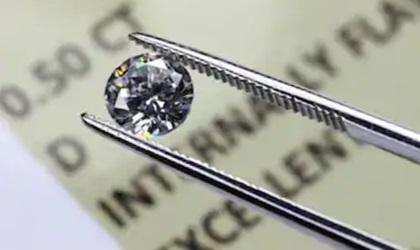
When you are shopping for a diamond ring, the grading report (certificate) is a vital document that contains information about the diamond’s quality.
As a consumer, the grading report helps you understand what you are buying and to a certain degree, enables you to justify its value and the price you should be paying.
Because of this, you should only buy a diamond with a grading report that originates from a neutral 3rd party to prevent any conflict of interest and biased grading.
Among other uses, a grading report (certificate) from a reliable gemological lab also acts as a security screen against treated and synthetic diamonds. Thanks to a series of tests and scientific analysis performed during the grading process, it is possible for gemologists to detect the presence of artificial treatments in color or clarity.
Basically, a grading report not only provides you with a scientific blueprint of the diamond’s properties and characteristics, it also attests to the diamond’s authenticity.
In this article, we will take an indepth look at various gemological labs and grading reports you will come across in the market. You will also find out what are the differences between them and which are the ones you need to avoid.
An Abundance of Grading Labs Around the World But…
Not all laboratories are created equal.
As a consumer who is shopping for a diamond engagement ring, it is extremely important for you to understand the differences between the various gemological institutes and grading certificates.
You see, each lab uses its own grading system and nomenclature.
Some labs are strict and consistent while many others have loose standards and inconsistency. As a result, a report from one institute may show significantly different results from a report issued by another lab for the same diamond.
The problem here is that having an inaccurate assessment of the diamond’s quality would affect its value and the price you should pay for it. If you didn’t know better and made a purchase based on a certificate with inflated grades, you would likely be overpaying for a diamond with inferior qualities.
What Are the Most Popular Diamond Grading Labs in the World?
Let’s take a look at 4 of the most major gemological labs in the world – GIA, AGS, EGL and IGI and find out what the differences are between them.
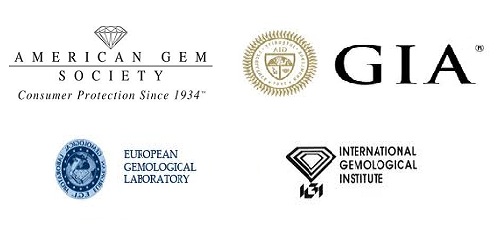
GIA, the Gemological Institute of America, is the leading gemological laboratory in the world. It is the industry’s most trusted and most widely used service. Headquartered in Carlsbad, California, GIA has offices in many cities around the world, employing more than 1400 scientists, educators and certified diamond graders.
Besides gem grading and certification, GIA also provides educational services and carries out intensive research work to keep up with fast changing technologies in the gemological field.
In the industry, the GIA diamond reports are highly recognized for their strict grading standards and proven consistency. When buying an engagement ring with a GIA report, it provides you with the greatest peace of mind that the diamond’s quality is accurately represented.
AGS stands for American Gemological Society and it is also a US based laboratory (with main offices in Las Vegas). The AGS laboratory is renowned for its scientific approach and research in diamond cut grading. Instead of using an alphabetical rating system, AGS uses a scale of 0-10 for rating a diamond’s characteristics, with 0 as the best and 10 as the worst.
Like GIA, AGS is also known for their ethical standards and consistency in their grading system. In the US market, the AGS lab is the second most widely used lab service after GIA. They are also globally consolidated through offices in Israel, Belgium, India, China and Hong Kong.
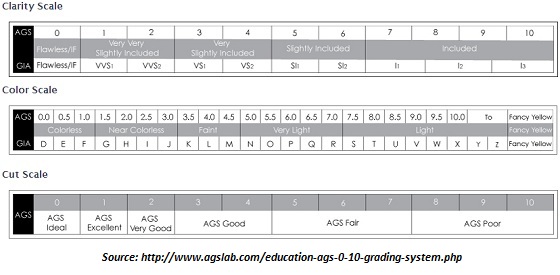
For first timers, the AGS methodology may seem confusing to figure out but once you get the hang of things, it’s pretty straightforward. Here’s an example to help you out: if a jeweler tells you that a diamond has an AGS cut grade of 0, clarity grade of 3 and color grade of 2.5, the equivalent on the GIA scale is a diamond with Excellent cut, VS1 clarity and I color.
AGS is a trusted gemological lab with reliable grading standards and they assess cut quality on a stricter standard compared to GIA. At the core of AGS’s cut grading system is a robust optical ray-tracing assessment which measures the light performance of a diamond.
In the industry, the truly well cut super ideal diamonds are sent to AGS instead of GIA as that is where the “wheat is separated from the chaff”. That’s because the AGS cut grading system is a lot more advanced and less forgiving when assessing a diamond’s craftsmanship and performance.
EGL is an abbreviation for European Gemological Laboratory. It is a European founded grading agency and has a big global presence – with offices in London, Paris, Tel Aviv, Tokyo, Johannesburg, among others. EGL is known for pioneering diamond grading techniques for stones weighing less than a carat and has a large market share in Europe.
They are also notoriously known for the introduction of the ‘SI3’ clarity rating for diamonds and have also been embroiled in controversial consumers lawsuits for overgrading diamonds.
Do Not Confuse Certification and Appraisals
This is one of the most common scams in the industry where consumers get ripped off. Many unethical jewelry stores offer “wholesale deals” with questionable grading certificates designed to misrepresent the diamonds they sell.
An appraisal is usually performed by a trained professional operating in an individual capacity and pegs a value to the jewelry. Unlike a report generated by an independent gemological lab, the accuracy of the appraisal is only as accurate as the training, skills and tools the appraiser has.
Note: An appraisal is typically used for insurance purposes and post-purchase follow-ups. It shouldn’t be used as a substitute for a grading report.
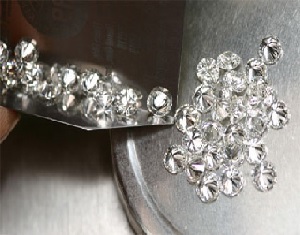
And finally, IGI is the International Gemological Institute that is based in Antwerp, Belgium. After GIA, they are actually the 2nd most well-known lab in the world.
IGI actually grades a significant amount of polished diamonds in the market and they are prevalent in Asian countries. IGI also grades synthetic diamonds on a commercial scale.
While EGL and IGI are more widely known in Europe and Asia, they both operate offices in key cities like New York. As a result, it won’t be uncommon for you to see retailers carrying diamonds with reports from these labs.
Now, I’m going to go on record to say that EGL and IGI are labs I DO NOT RECOMMEND.
It’s ironic in the sense that gemological laboratories were created with the goal to protect consumers by providing reliable information. Yet, I am warning you against gemological labs like EGL. Find out why on the next page…
Related Articles
Leave A Comment

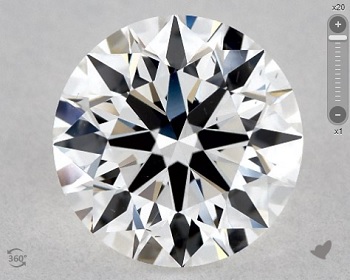

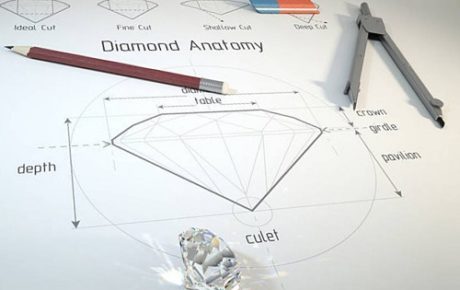

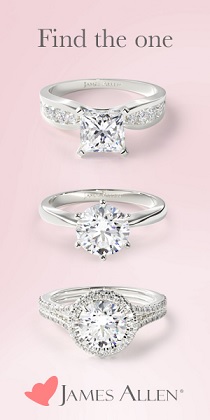






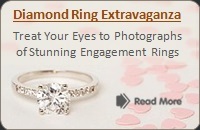
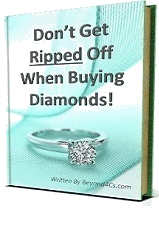

69 Comments
Clearly to me there is very little. A must read for all the diamond trade and consumers, GIA is not as clean as the trade report. http://www.nationaljeweler.com/diamonds/grading/GIA-recalls-hundreds-of-diamonds-8457.shtml
Lapses do occur from time to time no matter how reliable any grading lab is. This story only cements the reason why you shouldn’t buy diamonds that aren’t graded by GIA/AGS labs. Unlike many other labs who do not routinely invest (or have the capital) in research or new equipment (and allowing treated diamonds to bypass the grading process), GIA is actively at the forefront of identifying such treatments and taking measures to prevent such recurrences.
Hi Paul,
Understand from the retailer that IGI offers the “ideal cutting” in their report while GIA only offers “3ex”. And they really proved to me that the IGI diamond tends to be more brilliant than the GIA diamond although the GIA one has better colour and clarity.
Which made me confused about igi vs gia and what to choose for my diamond. Can you advise?
When it comes to comparing grading standards between IGI vs GIA, I can tell you that the latter is the better choice of lab. IGI simply uses different nomenclature for their cut grading and this does not mean that IGI is better than GIA in that regard. To be very clear, an ideal rating from IGI doesn’t mean that the diamond is better cut than an Excellent rating from GIA.
I would stick with GIA. And with that said, the GIA triple excellent range is very broad and there’s garbage there in terms of cut quality. Here is a link for more reading: https://beyond4cs.com/truth-about-gia-triple-excellent-diamonds/
CUT determines the diamond’s sparkle; not color and not so much on clarity. What GIA offers is an accurate grading standard of color and clarity. Stick with GIA and use this step by step process to cherry pick the best stone.
https://beyond4cs.com/step-by-step-guide/
Anybody heard of UGL – USA please, an independent laboratory for the Certification of diamonds and coloured stones
Nope. Never heard of them and even if I did, I won’t trust their grading report to be on par to similar standards like GIA or AGS.
What about AIG certificates? Have you had any experience with them and is it reliable.
You can safely assume all other labs not mentioned here WILL NOT have grading standards on par with GIA or AGS. Whether it is AIG, AGI, GSI, IGA or whatever other small unknown labs, you should avoid ALL of them. Let me say this again that the industry doesn’t recognize all other reports besides GIA as AGS for reliable grading. If you buy a diamond with any other cert or report, you can be sure that they are unreliable and likely used by jewelers to scam you.
Anybody heard of DIA (diamond institute of America) and how good are their certification standards?
Never heard of them. Take what they grade and the documents they provide with a pinch of salt.
Very informative article! Now I can be able to identify different certificates needed for diamonds to identify its worth. Thank you so much!
Hi,
I am picking out a diamond for the first time for my engagement ring. With much research I think this diamond, well it appears to be good quality and a great choice. Going to set it on an 18k solitaire, six prong. Prongs are white gold. Just wondering if you think this diamond is a good purchase. Here’s the website, https://beyond4cs.com/go/ja/
SKU-586963
Ty!
This is not a well cut diamond. I would recommend this stone instead: https://www.jamesallen.com/loose-diamonds/round-cut/1.06-carat-k-color-vvs1-clarity-excellent-cut-sku-19429
Unfortunately that’s out of my price range, can’t go beyond $4,000 for a diamond right now. Thanks for your help! I really appreciate it. I am concerned because I am going for a yellow band the diamond will look yellow with a K cut.
With a yellow band, even if you bought a D colored diamond, the stone will still look yellowish. If you don’t want to see any color in the diamond, I would advice you to consider white gold or platinum instead.
Thanks for all your help and advice! Really appreciate it. I found a k, vvs1 in my price range. I am going to go for it, based on research and your advice, I think it will be well worth it. Thanks again!
Has anyone heard of the International Institute of Diamond grading and Research – part of the De Beers group.
on the face of it their reports look pretty detailed. Have you done a comparison of iidgr vs gia before?
It’s a relatively new grading service who expanded their reach across Asia and Europe. Personally, I don’t have any prior experience with them and can’t tell you much that you don’t already know.
Hi I got an engagement ring (from IGI) per below spec;
Cut – ideal cut
Carat – 0.53g
Grade – f
Clarity -v s1
Cost S$5337
Is it a good buy
I will never spent a single cent on a diamond that isn’t graded by GIA or AGS and that’s coming from someone with a professional background in the trade. As I had mentioned in the article above, my stand is pretty obvious,
Yet oddly enough ALL gemological certifications have some sort of small print-downloadable disclaimer. To the effect that they will not be held legally responsible for any inconsistencies. Even the GIA was fooled by Boron treatments.
A certification is not a guarantee of anything. Shhh we can’t tell the public..
Anyway, it’s not odd. A certificate is a guarantee of something.
GIA has always been upfront that the grading report is NOT a “certificate”. The issues lies at the bottom of the sales channel where people assume or get misled by sales tactics.
What is the best diamond certification if I am buying a 0.3 carat ring? I tried asking for a ring with certification but they only have appraisal documents or are uncertified.
The statement about the “best diamond certification” is technically incorrect. Gemological labs do not certify anything but offer an opinion on a diamond’s quality. GIA is the best and most consistent among all the labs. You get what you pay for and if you think “cheaper” diamonds with unreliable lab reports are deals, they will only end up as costly mistakes.
Dear Friends – Warning about BEVERLY DIAMONDS of California:
I am filing a formal complaint against Beverly Diamonds, also known as Luxurious Jewelry, of 550 S. Hill St., Suite 542, Los Angeles, California.
I purchased a wedding ring set consisting of an engagement ring and a wedding ring from Beverly Diamonds (BD) on 12/26/2015 for $3,475.31. BD advertised that the center diamond was graded as a .70 Carat, (F) Color, VS2 Clarity Enhanced diamond.
I took the rings to three different jewelers to get quoits for resizing the rings and to have the jewelers evaluate the quality of the rings. All three jewelers said the rings were of poor quality with four of the small side-mounted diamonds set incorrectly. The four smaller, side diamonds had the sharp edges of the diamonds exposed and posed an injury risk to the wearer. The jewelers also noted the larger center diamond was of extremely poor quality and certainly not a VS2 Clarity Enhanced grade. It was suggested that I take the rings to a professional consultant for evaluation. I had a Gemological Institute of America (GIA) professional grade the “Clarity Enhanced” center diamond. The GIA consultant graded the center diamond as a .68 Carat, (G) Color, I2 Clarity Enhanced, Class 2 Cut diamond. The GIA consultant also noted that the exposed side diamonds posed a risk to the wearer and the exposed diamonds were unprotected from damage. The GIA professional agreed that the rings were of general poor quality and that to call an I2 Clarity Enhanced diamond a VS2 Clarity Enhanced diamond was fraud.
I have contacted BD many times asking to return the rings for a full refund. Beverly Diamonds has not complied with my request. I filed a complaint with the Better Business Bureau (BBB). BD has 33-other complaints filed with the BBB for similar fraudulent business practices. Other consumer protection web-sites have dozens of complaints posted about Beverly Diamonds.
I am available to provide any additional information and/or documentation.
Thank you,
Peter Zane Williams
Hi Paul. Great blog. I was wondering if you have heard of any difference in grading levels between GIA labs in US v. India. A jeweler suggested to me that GIA India tends to be less strict on the color grade than GIA US. Upon inquiry, online retailers seem to not know which GIA lab rates the stones they sell. Thanks!
Well, that’s just rubbish. Unless your jeweler sends his own stones to a particular labs and reveals all the paper work involved in that, he probably has no idea where the diamonds in his inventory is graded from.
Secondly, GIA India and GIA US labs have similar standards. In short, your jeweler is just trying to make a case against changing technology and retail habits. It’s just a narrow business mindset they have and I can tell you these kind of jewelers won’t last long in the industry.
Your responses are so timely! Your website has great information. How do you match a GIA report to an actual diamond? What’s stopping a sales person or jeweler from showing me a diamond with a GIA report that matches a different diamond? What protection do I have against that.
Also-I will probably buy online, but what’s the negotiating power for a consumer at a physical store, what percentage can I expect to negotiate?
Read this: https://beyond4cs.com/care-and-maintenance/how-to-avoid-diamond-switching/
As far as I know, prices are non-negotiable online. They are already low to begin with. You may get a one-time discount $25 at White Flash if you sign up for their newsletter: https://www.whiteflash.com
Have you heard of GGL certification? The website is here http://www.globalgemlab.com. I wonder how a cgl vs gia report would compare.
Thank you in advance
Nope. Don’t rely on grading reports by them when making a purchase or you’ll end up overpaying for inferior quality.
Hi Paul,
I was just about to ask a question about India GIA vs NewYork GIA, but I see that you’ve already answered very similar questions, from Alex.
I wanted to let you know that I have taken your advice and only accept GIA diamonds. I also wanted to let you to know that I appreciate your free knowledge and responses to questions and I have recommended friends to read up before they consider an engagement.
Thanks
Lap
Hi Paul,
I was wondering if you had heard of a grading outfit called WGI, and whether you had a view on the accurateness of their assessments and if they are reputable?
Thanks,
Victor
I will say again for the benefit of readers who can’t seem to read or understand English. I’m going to restate it and make it real simple.
Unless the lab is GIA or AGS, 99.99% of ALL other labs are not reliable and ones that you can trust for accurate grading.
You would be a fool to think otherwise.
A local jeweler showed me an IGI diamond with better proportions than an GIA diamond, in fact within the ideal specifications. If IGI certification is more lax, why is it more expensive than the GIA diamond? GIA: 1.2ct, D, VS2, triple Ex, 61%table width, 41.4deg pavilion angle, strong blue fluorescence.
IGI: 1.2ct, I, VS1, Ideal cut, 56% table width, 34.8deg pavilion angle, no fluorescence.
Thanks,
Sue
You aren’t comparing apples to apples. You are basically comparing a rotten apple against a rotten orange. The strong blue fluorescence and the terrible cut proportions will cause lower prices. Both stones aren’t good options.
Ive been a Master Diamond Grader for the last 10+yrs. Ive worked as a grader at both GIA & AGS Labs. Honestly, I have more trust in AGS.
Does anybody know anything about IDGL (Independent Diamond & G.R. Laboratory) or the UGI diamond certificate? Are they any good or bad?
Hi Paul, we recently bought an “I Am Canadian” diamond ring in St John ND, that was marked as clarity IMP1 and color K. We can’t any charts or references to IMP1, so I’m supposing we were ripped off. Just found your website. Can you offer any info on IMP1? Many thanks
IMP1 is not a gemological term that GIA uses. It likely means imperfect 1 and a low clarity grade. From the looks of things, I can tell you that you had likely been ripped off and bought a diamond that’s “overgraded”.
Hi Paul,
My ring is being auctioned online. I have access to a supposedly downloadable grading report. My question is how do I verify if the Report is legit? I see an item number and a Certificate Number. However, there is no Report Number to verify.
If you know a little basic gemology, it is possible for you to verify the report in person by verifying the inclusion plot against the diamond. Otherwise, as a layman consumer, you don’t. You just have to take the word of the seller (better make sure they are reliable). And as a word of caution, nothing good comes out of auctions (unless you are talking about big names like Sotheby’s and buying the one of a kind rare diamond) as they usually offload low quality stuff to unsuspecting consumers. There’s too much junk at overpriced costs such that you would be far better off shopping for a brand new ring at an online jeweler.
Anybody heard of ‘ DGI New York ‘?
Guess it is not comparable to GIA or AGS so better not to buy?
Never heard of this company or gemological institution. There are literally hundreds of dubious grading labs in New York and NONE would be on par as GIA or AGS.
Poor European countries we are … especially france huh ? Why ?? French pples are the best in jewellery this country is asked by Americans ,Japanese ,Chinese Arabic saoudite etc…. why lab Europeans is ever attack by you ? First remember who invented the shape : marquise ok ? Also much country say American GIA is the best nooooo !!! Is a liar !!! American copy french jewellery first and have study french and European Gemmes so please leave us in peace and copy us like ever thanks.
This article is in no way attacking Europeans or Europe countries. There are plenty of mediocre labs in the States and many parts of Asia as well. The fact is, these 2 laboratories which just happen to be US based companies are the best in the industry.
hi Sir,
i very confused in GIA Best Measurement (like wise 6.35*6.35-6.40)
so give me best measurement was best suitable with weight…
your knowledge is very use full to resale of diamond..
thanks boss
You can refer to the dimensions and charts here: https://beyond4cs.com/carat/size-chart/
Hi Paul, i have bought a diamond from a shop in Jaipur (India) saying that this diamond is origin of the Golconda mines. It comes with an indian diamond certification from IGA but there are only very little details on the 4Cs. Can we get the origin of the diamond by getting tested in GIA/IGI/AGS laboratory?
GIA doesn’t grade diamonds or provide info based on the stone’s origin. Also, I can tell you outright that you probably made a big mistake buying the diamond without a report in the first place. It’s silly and to think that you are now trying to pay good money after bad.
Is Gemological Institute of Europe (GIE) cert reputable? Thanks
No. I have stated clearly over and over again. If the report doesn’t come from GIA or AGS, it is NOT reliable. Period. It really is as simple as that.
Hi Paul – Reading through your website, and thanks for the information.
I do see a bit of a contradiction in some of your advice – in relation to buying Lab Made diamonds, you praise Brilliant earth and the lab made diamonds overall, and the benefits of buying online..
However, in the article above and the comments, you state that you would never spend a cent on a diamond that isn’t graded by GIA or AGS.
As you will know, the brilliant earth diamonds are graded by IGI in most cases… So this leaves me with some confusion and apprehension.
Are you still recommending the lab diamonds, even though the representation of them is assumed to be incorrect?
Sorry for the confusion. I would just clarify that I won’t buy a NATURAL diamond without a GIA or AGS report. Diamonds that don’t come with reliable reports like these are usually deals and marketing gimmicks used by jewelers to rip consumers off. For LAB GROWN diamonds, the situation is a little different. GIA and AGS do not grade them on a commercial scale. IGI is the only lab that is widely accepted and given that, you really have no choice but to go with an IGI report (lesser devil) if you are buying a lab created stone.
The information provided in your site has been very helpful. I am needing a little more information concerning a stone I have that is in a security seal. It is dated 9-20-1991. Written on the front REGISTERED JEWELRY INDENTIFICATION
Size 1 Carat
Cut 58 Facets
Shape Round Brillant
Finish Good-/ Excellent
Characteristics Internally Flawless
Approved by Staff Gemologist 1744
Back warning security seal
1991 IHS M0665A-M
I can’t recall where I got it. I always thought that it was fake but really never gave it much thought until today.
Any information would be appreciated. Thank you for reading my post.
I have no idea what you have. If you want to identify the stone (diamond), unpack the diamond and send it to GIA for a grading report. That will give you a certainty of what you have on hand now.
Hiya Paul, Have you heard of SGL for grading diamonds? I know you have stated above that you do not trust anyone other than AGS and GIA but I wondered if this SGL may be new and may be okay.
Nope. I’ve never heard of SGL and I will say this over and over and over and over again. If you don’t want to get ripped off with buying a misrepresented diamond, you should buy only GIA or AGS graded diamonds. Jewelers who try to sell diamonds with ANY OTHER certificates from dubious or “new” labs are out to screw you over. It’s as simple as that.
What can you tell me about the usage of the word Argyle pink in a certificate of AIG? Does this mean that it comes from the Argyle mine in Australia? And knowing that it is a brand name “Argyle pink” is it even allowed to use this name on a certificate? Thanks in advance for your expertise, kind regards, Roger
Well, it could mean anything for marketing purposes. Whether it means the diamond has a similar color to an Argyle pink or trying to make consumers believe that they are buying an “Argyle Diamond” or whatever marketing bullshit the jeweler is trying to feed you, one thing is for sure. No ethical jeweler or professional in the industry will send a true Argyle pink diamond to a non GIA laboratory for a grading report. There’s a devious reason why the particular lab is selected. And that is to misrepresent what they are selling and to rip you off.
I made made a huge effort in 2000 to research diamond particulars when buying the engagement ring for my wife. I’d have to go look, but what I purchased had a AGS or GIA cert. While on the smaller side, I went after the remaining ‘3 C’s’ in very high quality with a round cut. I will never forget the sunlight dancing off the walls of the plane on our honeymoon.
Fast-forward 19 years and a few diamonds in between, and again never forgot the lessons learned and went for a very simple round diamond pendant necklace with gold chain (.23 carat, F color, VVS2, Ideal cut). And again, with a GIA cert.
Thanks for your blog. It was a reminder for me, and also for those wanting to get value in their purchase, I agree with you that having GIA or AGS backing is very important. Don’t waste your money on sales pitches. Know the facts first when buying your diamond!
My mother passed away and left a ring that has a 2 carat diamond in the middle and 1carat on each side (4 carat total ) i have an appraisal from 1978 at 20,000.00 ….I have taken it to some jewelry stores and have only been offered 10,000.00 ….surely diamonds have went up since 1978 instead of down…just wondering if I have any other options ….Thank You
Well, I think it is a misconception you have about diamond prices. First of all, if you want to determine the value of a diamond ring accurately, you need to know exactly what are the specifications of the diamonds in your ring. A 2 carat D/IF diamond is going to cost alot more than a 2 carat J/SI1 diamond. If you have a GIA report for the diamonds, then go do your research here and find out what the retail prices are. If the combined amount is $30,000 at retail, then realistically, if you can get back 50% of retail prices, you are already doing very very well. Put yourself in the shoes of the diamond buyer and ask yourself what’s in for them to buy the diamond ring from you at a higher price when they could just get them from their suppliers brand new and with no commitment to holding the inventory.
Hi Paul,
Great site! A few years ago you wrote “nothing good comes out of auctions as they usually offload low quality stuff to unsuspecting consumers.”
How bad things are now? In particular, at Riverside Galleries online auctions, where the pieces are appraised by AIGL. I assume pieces are not fake and worthless but wonder how much we overpaid.
It’s still the same. Diamond jewelry that comes with unreliable certificates is purposefully done so for a reason. And that reason is not done for the interest of the consumer.
I believe taking advice from a forum one should always ask where did the moderator study for his/her certificate. If one completed training at GIA they will always defend GIA. Please remember every certificates say, “This is only an opinion” (laboratory protection)
So, gemstones are always worth whatever the buyer will pay regardless of the certificate. In fact, precious gemstones are sold all over the world EVERY DAY for high prices without certificate.
I’ve removed your link profile because you are clearly here with an ulterior motive. Now, I graduated from GIA but I don’t defend all their practices. And you seem to be insinuating that everyday, normal people who have no clue about diamonds/gemstones buy them “regardless of the certificate”. That’s a big disservice to readers. If I were to sell you a 2 million pink diamond without a GIA certificate, would you do so? That’s plain stupidity if you were to say yes.
Would Paul Gian be able to offer me advice on where to sell a beautiful 2 carat G engagement ring from 1945? There is an online auction, Worthy, claiming to be the best place to sell estate jewelry. My mother, then an aeronautical draftswoman and a Revlon model, designed it. It is “wow” according to appraisers and jewelers. I appreciate that Mr. Gian is giving advice for the laymen I cannot find anywhere else. Thank you.
There are plenty of places to sell but if you want to get a better price, the story behind will actually help sell the ring especially if the wearer is someone influential or well known. Otherwise, most jewelers will just treat it as another generic piece of 2nd hand jewelry and offer scrap prices for the ring.
Go here for a start: https://beyond4cs.com/faq/tips-for-selling-a-diamond/